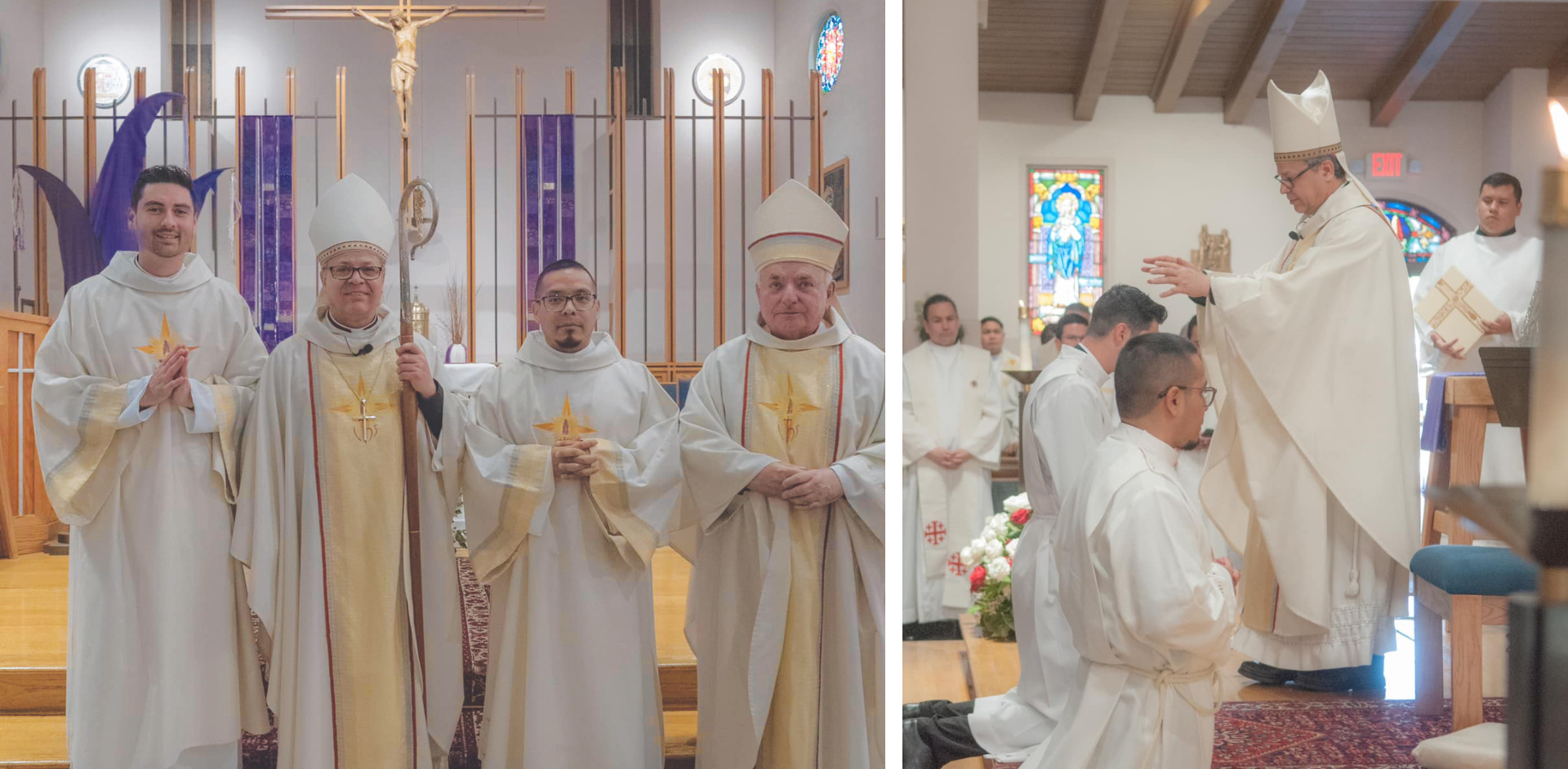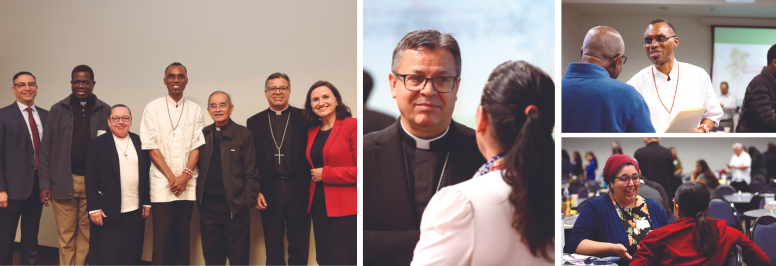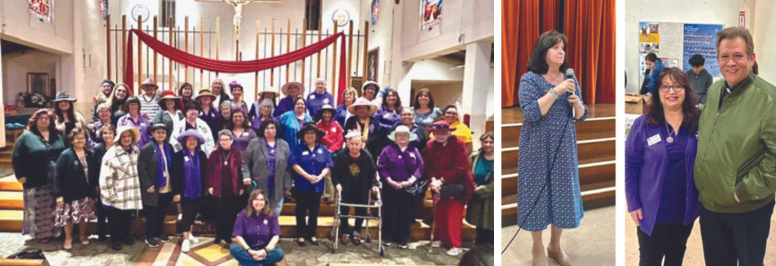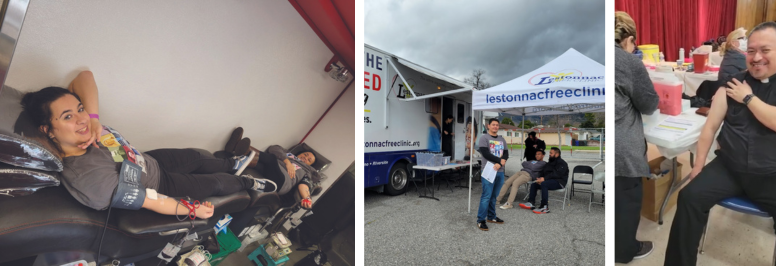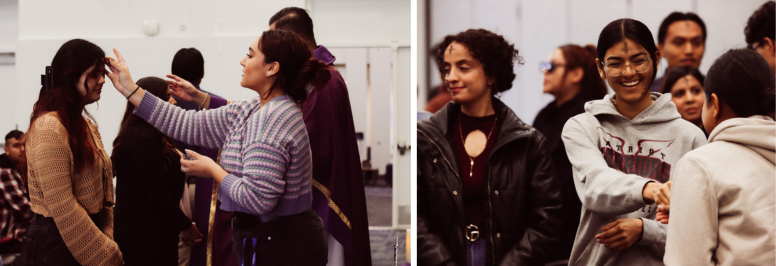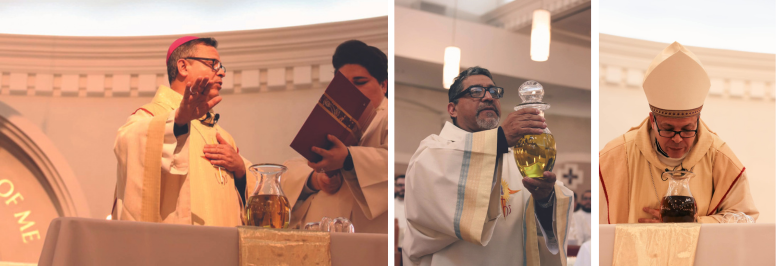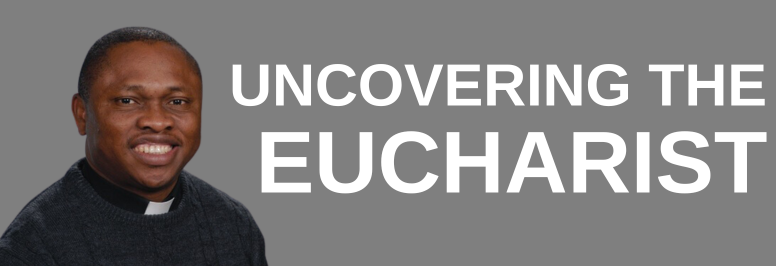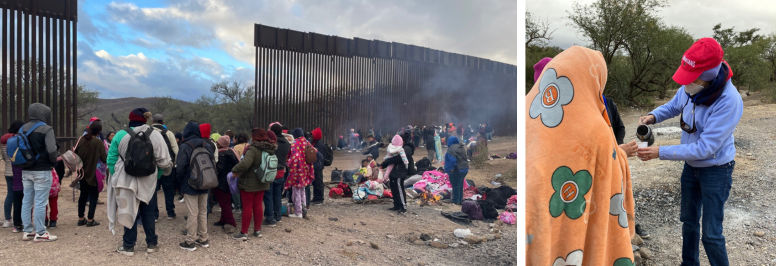With this theme the Holy Father invites us to a Jubilee Year of both internal conversion and evangelization. We are to look at how we live this ideal of Mercy in our communities of faith but also how we take it out into society for the lifting up of all God’s people. It is a year to evoke change in the hearts of individuals and communities but it is also an opportunity to offer an alternative of life to a society in need of reconciliation, unity and peace.
The Year of Mercy begins with the opening of the Holy Door at St. Peter’s Basilica on December 8, the Solemnity of the Immaculate Conception, and closes on November 20, 2016, the Solemnity of Christ the King.
Our Diocese, in communion with the whole Church, wants to live with much intensity this calling of Pope Francis and so I write this Pastoral letter to invite all men and women of good will to prepare for a year of grace that brings peace, reconciliation, mutual help, and healing to all who live in this region.
I will now identify some areas of focus for the Jubilee Year given to us by Pope Francis in the Bull of Indiction: Misericordiae Vultus (Apr. 11, 2015): and some local initiatives that are planned. I will also offer questions for your reflection as you read this letter.
Finding spaces to practice forgiveness and mercy
I invite the People of God: priests, deacons, men and women religious, and lay brothers and sisters to dialogue in community and with the enlightenment of the Holy Spirit to identify those areas of pastoral and social life that are in the most urgent need of the Mercy of the Church. Each community must discern what it can and must do so that daily life of people and parish activities are an expression of the mercy of God. We can make an action plan to respond to the challenges that our reality poses in a process that starts with simple actions but which aspires to the ideal of Pope Francis’ call to be “Merciful like the Father.”
The Holy Father has identified various pastoral actions that express the mercy of God, but it is our communities who must make them concrete in their own reality.
One is that we must open our hearts to the marginalized, those living on the outermost fringes of society: fringes which modern society itself creates. The work of our communities is to identify in our local reality those who are marginalized and to offer them the oil of consolation and the bandages of mercy. Who are the marginalized in your community?
The Pope invites us to follow the example of Jesus who, instead of observing legalistic criteria, shows us the face of forgiveness and accompaniment in situations of sin. What are these situations of sin that need to be seen from the side of love and not from an enforcement of law?
As employees, ministers, preachers and priests we seek to always inform our words and actions with a sense of charity; a simple but powerful approach for all of us who serve the Church to adopt in a more permanent manner. We must defend truth but never without charity, because in the end, Pope Francis tell us, “all this rich teaching is channeled in one direction, the service of mankind, of every condition, in every weakness and need.” What are some situations in our lives where we can better offer a sense of charity to those we encounter?
This year, let us open ourselves to learn what God is revealing to us through the people who come to our church and also those who no longer come. In a special way, I hope that we listen to the youth, some of whom don’t feel as connected to our faith as we would like. Let’s listen to them and learn from their culture, where the kind of mercy and openness that Pope Francis speaks of can often be found.
It is always possible to begin anew. God does not tire of forgiving, but maybe our attitudes towards others, including those we love, do not reflect this gift of reconciliation and renewal that is there for us. Some questions on this point might be:
• How do we change that passive mentality which prevents us from seeing the potential of holiness and goodness in those around us?
• How do we offer those people who carry the burden of addiction, abuse or other traumas the light of hope which teaches us - that which is impossible to us is possible to God?
• How do we offer this experience of healing to people who suffer from mental illness or who live in broken, abusive or otherwise dysfunctional home environments?
God is good. He is merciful, and we are made in his image. Jesus, in turn, showed us the goodness of God “in the most real of needs.” When Pope Francis describes these needs, he recalls the Lord’s multiplication of the loaves and fishes to calm the hunger of the people, the visit to the widow of Naim to offer consolation and His curing of the sick throughout the Gospels. What are the most real needs in our communities?
There will always be something we can do to help others. The Pope insists “let us rediscover these Corporal Works of Mercy: to feed the hungry, give drink to the thirsty, clothe the naked, welcome the stranger, heal the sick, visit the imprisoned, and bury the dead. And let us not forget the Spiritual Works of Mercy: to counsel the doubtful, instruct the ignorant, admonish sinners, comfort the distressed, forgive offenses, bear patiently those who do us ill, and pray for the living and the dead.” All these acts of mercy should be our priority in knowledge and in practice.
The spiritual focus of this year is forgiveness, “where the Church is present, there is where the mercy of the Father must be visible. In our parishes, in the communities, in associations and movements, in short, everywhere there are Christians, everyone should be able to find an oasis of mercy.”
And this forgiveness should be expressed as an opportunity for all, those who serve, and those we serve; because only those who’ve experienced the loving forgiveness of God can extend and project that attitude of forgiveness. “…The mystery of mercy. It is a wellspring of joy, serenity, and peace.” Therefore, we must find new ways that allow us to experience forgiveness and at the same time offer that richness to all those around us. Forgiveness and mercy are not marketing strategies, they are the center of Christian life. We must seek to bring them to our dialogues and interactions in our families, in our communities and workplaces and in the public square, where civility and respect are increasingly absent. How can we better apply forgiveness in the conflicts we encounter?
The care for the reputation of others is part of a merciful attitude. Likewise, the discrediting of a brother or sister is also a serious offense against the love of God. But how easy it is to make comments and judgements about others without taking into consideration this moral duty. If you will not speak positively of your brother or sister, then don’t speak of them. How can we educate our communities about the care for the reputation of others?
Because God is the Father of Mercy
We find throughout the holy scriptures the image of God as a loving Father who permanently comes to meet us as “a Father rich in mercy” (Eph 2:4), as the “a God merciful and gracious, slow to anger, and abounding in steadfast love and faithfulness” (Ex 34:6). The revelation of God in the Old Testament expresses the mystery that “the Lord watches over the sojourners, he upholds the widow and the fatherless” (Psalm 146). In ancient rituals of the Mass it was already proclaimed in the opening prayer that God reveals his omnipotence above all in mercy and in forgiveness. Psalm 136 is a confession of faith in God (“For his mercy endures forever”) that Jesus used as a form of prayer (Matthew 26:30).
All of Jesus’ life was proclaiming this revelation of God – the multiplication of the loaves and fish, the resurrection of the widow’s son, His calling of the disciples. The love of God is made concrete history in the person of Jesus of Nazareth.
Some of the most beautiful parables contained in the four gospels, such as the Good Samaritan and the Return of the Prodigal Son show us that the mystery of God is manifested when we experience His forgiveness.
Jesus teaches us that to reach happiness is to pass through the path of love and mercy (“Blessed are the merciful for they will be shown mercy”). When is the last time you felt the mercy of God?
Our Beloved St. John Paul II said, “the Church lives an authentic life when she professes and proclaims mercy – the most stupendous attribute of the Creator and of the Redeemer – and when she brings people close to the sources of the Savior’s mercy, of which she is the trustee and dispenser.”
How will the Year of Mercy be observed in our Diocese?
Beginning with the Pope’s proclamation of the Jubilee Year, the Vatican has given us many cues for living this Year of Mercy. But at the same time, engagement, creativity and freedom at the local level will be key to having a truly transformative experience of Mercy. In other words, we must take ownership of the Year of Mercy in our lived reality of faith. I see this unfolding at many levels – diocesan, vicariate, parish and family home.
As a Diocese we will offer two liturgies, to open (Dec. 8) and close (Nov. 20, 2016) the Year of Mercy. Our Diocesan Masses offer a rare chance for shared celebration among our many communities of faith as we pray and celebrate as one under the leadership of Pope Francis.
As a symbol of our reflection on Mercy during this Jubilee Year I am asking every parish to design a Mercy Cross. Reflecting the creativity and vision of each parish, this Cross is to be a visual reminder of the journey each community will take in Mercy. In a similar way I invite every family to also create a Mercy Cross that might be displayed in the home and serve as a place for praying together and sharing faith.
In the six vicariates of the Diocese – San Bernardino, Riverside, West End, High Desert, Low Desert and Hemet – there will be opportunities to make a pilgrimage to a shrine or other holy site designated by the pastors of those parishes. Vicariates will also coordinate to increase the availability of the Sacrament of Reconciliation.
I know that there will be many other opportunities in our parishes and in our Catholic homes to observe this Year of Mercy, done in ways that are symbolic, catechetical and practical. I leave it to the creativity and inspiration of the people and, of course, to the work of the Spirit to provide the color and detail of these events and programs.
Marian Spirituality
Pope Francis has placed Our Mother Mary as Model of Mercy and as Star of this Jubilee Year. Beginning the Year on the Feast of the Immaculate Conception reflects that Mary must be our model and our guide. The history of the Church teaches us that Mary is the best evangelizer. Without her it is very difficult to open our hearts to a profound conversion. She will be our teacher this Jubilee Year, she will accompany us and to her we will pray that she intercedes for us. In this spirit I am encouraging both vicariates and parishes to hold a Marian celebration as a means to honor and reflect her connection to mercy.
We are called
Dear brothers and sisters, this year is a beautiful opportunity to enliven our communities with the strength of this message of love and mercy. We are carriers of a powerful message which can positively influence our families, parishes, neighborhoods, and society.
May the Father and the Son and the Holy Spirit accompany us as we follow the lead of our Pope in this year of reflection and action. And may Mary our Mother help us fulfill it.
I will close this letter with the prayer of Pope Francis for the Jubilee Year of Mercy
Lord Jesus Christ, you have taught us to be merciful like the heavenly Father, and have told us that whoever sees you sees Him. Show us your face and we will be saved.
Your loving gaze freed Zacchaeus and Matthew from being enslaved by money; the adulteress and Magdalene from seeking happiness only in created things; made Peter weep after his betrayal, and assured Paradise to the repentant thief. Let us hear, as if addressed to each one of us, the words that you spoke to the Samaritan woman: “If you knew the gift of God!”
You are the visible face of the invisible Father, of the God who manifests his power above all by forgiveness and mercy: let the Church be your visible face in the world, its Lord risen and glorified. You willed that your ministers would also be clothed in weakness in order that they may feel compassion for those in ignorance and error: let everyone who approaches them feel sought after, loved, and forgiven by God.
Send your Spirit and consecrate every one of us with its anointing, so that the Jubilee of Mercy may be a year of grace from the Lord, and your Church, with renewed enthusiasm, may bring good news to the poor, proclaim liberty to captives and the oppressed, and restore sight to the blind.
We ask this through the intercession of Mary, Mother of Mercy, you who live and reign with the Father and the Holy Spirit for ever and ever.
Amen.
In Christ,
The Most Reverend Gerald R. Barnes






